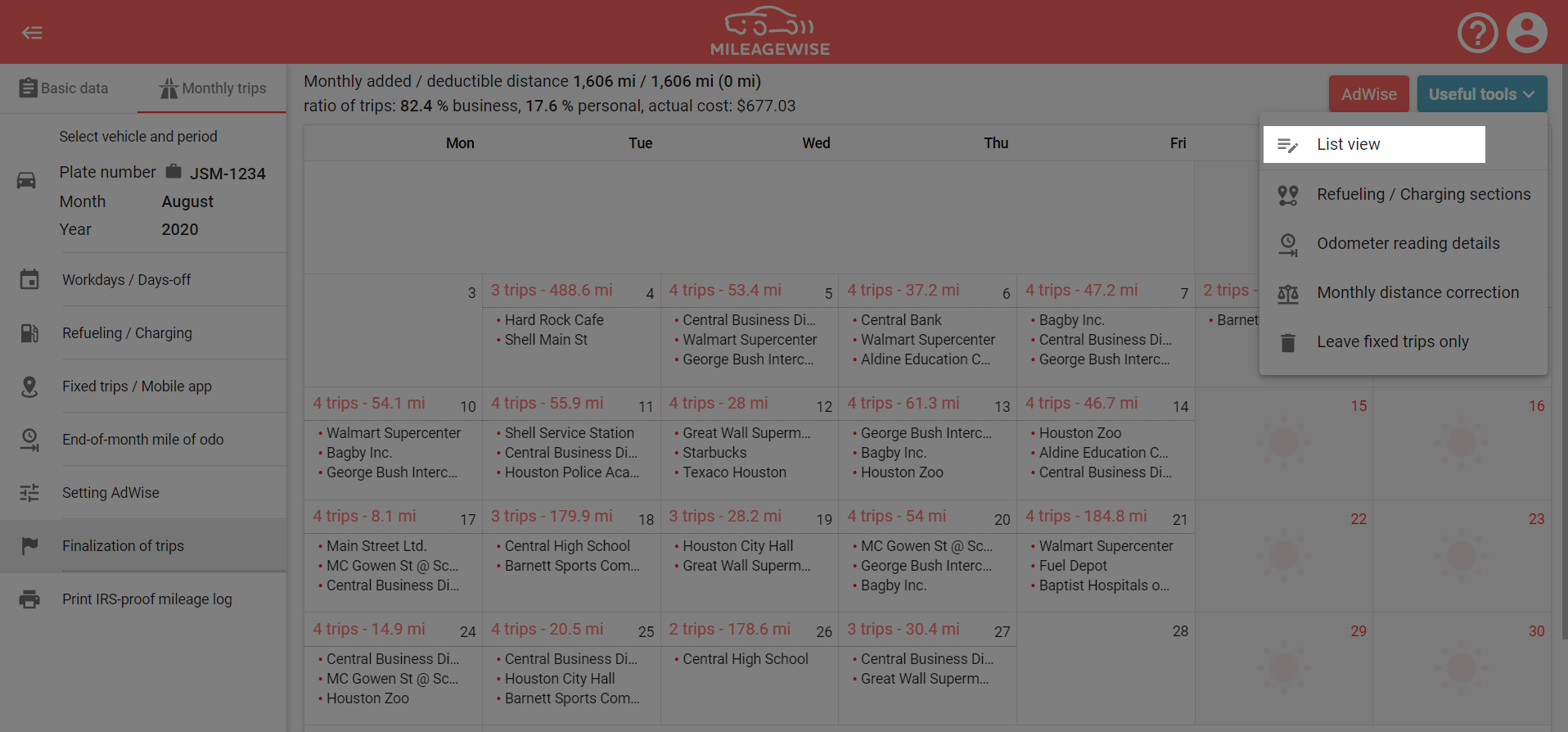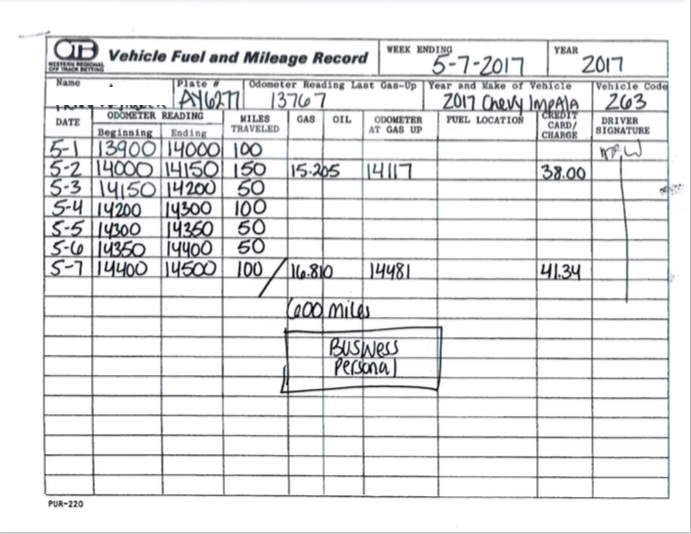September 5, 2019
Before the tax year ends, there’s a chance you have to face a few unpleasant surprises. If you have a small business, or you’re an independent contractor or a freelancer most of the tax-related administration is something you have to do for yourself. Even if you have an accountant, they might not offer you the best solution for your situation.
Furthermore, it is in your best interest to know about the details of these errands. If you record them wisely, you can find an average of $5,600 a year in the tax deduction of your business mileage. Or more. So keep your receipts and record your mileage.
But if the obligation of keeping a mileage log is fresh news for you, either because you do all your accounting by yourself and you missed the news or because your accountant just forgot to inform you on time, and IRS auditors are knocking on your door in the wrong time asking for non-existing mileage logs, you have a handful of options to choose from to make up for this shortcoming:
Keeping a mileage log on paper
When reconstructing your log retrospectively and on paper, there are numerous fixed pieces of information and circumstances you have to pay attention to It will make recovering your logs very difficult. You have to put the data very accurately into your mileage log. The cheaper the solution you use, the harder it will be to resolve these issues.
Let’s examine the case of recovering a year’s worth of mileage log for your tax returns.
You must include the date and amount of your refuelings in your monthly log (as you’re required to keep MONTHLY logs). For example, all of your refuelings should be presented, as they are one of the bases for your deduction if you choose to use the actual expense method as the basis of your deduction. But even if you use the standard mileage rate it is very useful to have the information about the amount of fuel you bought and based on that, the mileage you’ve driven so far.
As you cannot report more mileage than it is possible to drive based on the refueled amount and the size of your tank. You cannot drive more mileage with one tank of gas than it is possible based on the type of your car. An inspector can easily calculate how much gas you had before the amount you’ve refueled or based on the type of your car. Keep all receipts as the IRS can ask for supporting documentary evidence as well.
In your log, you’re required to provide the data of your yearly starting odometer reading. In the case of an IRS Audit, if they check your current odometer reading and the numbers don’t match with what the odometer is supposed to show according to your mileage log: That screams fraud.
So you have to be very, very accurate when putting the trips you’ve taken into their places. You cannot put too many into segments where you haven’t had enough gas and you have to remember dates.
So many dates.
You cannot put business trips into dates where you were on a holiday or weren’t supposed to work (because for example that would mean you worked for more than 20 hours in a row, which is very unusual). Or when your car was in service. You have to remember the service days anyway, because there they record the odometer readings, and register them in a system the IRS has access to. If they get your odometer readings when the service happened, and the data in your mileage log doesn’t match, that is just enough to get you fined.
Again, for the same reason: you cannot just guess the length of the trips you’ve taken. You must calculate the exact number – expressed in degrees to six decimal places almost -, which corresponds to reality because if you miscalculate something it won’t match your odometer.
Also, the number of companies you visited should correspond with your daily working hours and the industry average. Visiting 10-12 customers a day for a pizza delivery boy is suspiciously few, and for a service technician to visit just as many – is an alarmingly high number.
And yet we haven’t talked about the categorization. You are required by law – apropos: are you confident you know all the applicable legislation in place? Because there are some…– to give a purpose to every trip in your mileage log. Different types of trips will have different financial implications. Personal trips are not deductible, but mileage you’ve driven for business, charity, moving, or medical purposes is, but with different rates.
You need to know about these different rates, and you need to know about the law which requires you to choose from the two different methods to figure out your deductible expenses. You either can use the standard mileage rate or actual car expenses.
Are you familiar with these expressions and legislation? Did you know, that if you want to use the standard mileage rate for a car you lease, you must use it for the entire lease period, you can’t switch to calculating your actual expenses later.
Thought so.
It is tempting to report 100% business use. There are cases where you can explain why you have claimed 100% business use. However, everyone knows that in most cases it is impossible to prove this ratio of usage. Inspectors spot such a mileage log quicker than a blink of an eye.
And there are so many connections and interrelations you have to pay attention to! Unfortunately, there is a great chance you’ll make a mistake. And an experienced IRS auditor will notice these mistakes and inconsistencies.
You know we didn’t list all the circumstances an IRS auditor will look for when checking your paperwork? They look for non-compliances you don’t even know about.
So far we listed 10 things you should pay attention to but that’s just the tip of the iceberg.
But it’s no coincidence that MileageWise has wise in its name. It monitors 60 more of those problematic circumstances, so you don’t have to keep them in mind.
Our web dashboard and app, with the help of our AI Wizard feature checks and corrects all together 70 potential red flags (also monitoring the applicable legislation in that period, retrospectively too) your recommended logs will be good to go and IRS-proof, meeting every expectation.
Or you can use mileage trackers
Mileage tracking apps will track your mileage automatically. But sometimes they merge trips differently than you want them to merge. Other times they promise they are going to start working automatically when you start your phone, then they fail to deliver on that promise. And on top of all that, they suck up all your battery life and cellular data.
And we didn’t even mention that you cannot log drives retrospectively!
So what happens to you, in the case of an IRS Audit, if you have to hand in month-worth of mileage logs?
MileageWise got your back
Mileage trackers with GPS technology can only track real-time driving. You can’t use them for backtracking and reconstructing mileage logs retrospectively. Even if your driven mileage is based on reality, you just can’t record them that way.
But with MileageWise you can make up for forgotten mileage logs, with the AI Wizard feature, and by checking and correcting 70 potential red flags your recommended logs will be good to go and IRS-Proof, meeting every expectation.
After reconstructing your past mileage logs, you can continue tracking your trips with MileageWise. Just as you would do it with a mileage tracker. MileageWise can detect your trips automatically as well, but without using up your data and battery. When you arrive at a destination the app offers you a client and the purpose of the trip from an already existing database. You can always add new clients to your list, which then will be available for you automatically in the future. Before any modification, MileageWise will always ask you to approve it. So you will never find a big bundle of a merged mess of routes in your log, ever.
If you already use a mileage tracker app, you can import your already logged drive to MileageWise, which we will surely handle smarter by correcting 70 IRS red flags, when making you a recommended log of your taste.
You don’t ever have to worry, you see?
Follow us on Facebook, and stay up-to-date with what else we can help you with!






